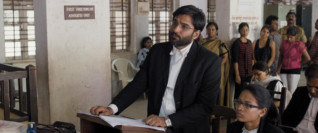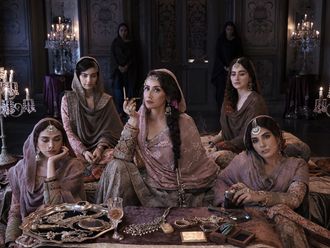
Behind the glitz and glamour of Mumbai, India’s financial hub and the birthplace of Bollywood, are real stories of real people with real problems. First-time director Chaitanya Tamhane set out to tell one in his drama, Court, about people caught in the country’s class and caste system explored via its legal system.
Tamhane and his collaborator Vivek Gomber, who produces and acts in the film, have had a glorious festival run since. It has so far won the $100,000 Lion of the Future award at the Venice Film Festival as well as the Best Film in the Orizzonti section. Then earlier this week, it won the Silver Screen Award for best film and best director for at the Singapore International Film Festival.
In town for the Dubai International Film Festival, tabloid! caught up with the two men to talk about Court’s successful run so far, and what the future potentially holds for them.
From Venice to Hong Kong Asian Film Festival and the Singapore International Film Festival, you’ve had a great run at the festivals. How does it feel?
Chaitanya Tamhane: It feels pretty much like a dream right now. Things are yet to sink in. But yes, we feel blessed and truly lucky. [I] could not have asked for better reception for a debut film.
Chaitanya, did you ever think the film would go to where it’s been?
Tamhane: Not at all. The film is Mumbai-centric and culture specific. I thought an international audience would be pretty much alienated. What is happening with the film is pretty much beyond anything I had imagined. I remember how happy were just being in Venice. The awards were like a bonus.
Take us back to how it all began with ‘Court’? Also, how did the two of you come together?
Tamhane: I met Vivek in 2009 for a play. It was called Grey Elephants in Denmark, which I had written and directed. We worked together in a director-actor capacity and the play was well received. Two years later, in 2011, I wanted to develop a script for a feature and was looking for a producer. Vivek decided to help me make the film happen. Since we had worked together earlier, he had faith in me.
How long did it take you to make the film?
Tamhane: It took us about three years from start to finish. The script took about a year to write, the prep and production phase lasted a little more than a year, and then the post-production and festival premiere took another year.
Was it difficult to get it financed?
Vivek Gomber: It’s hard to get any film financed nowadays, and when you have a first time director and producer on board it can be pretty rough. We were hoping to do a co-production and even tried for some grants, it just didn’t happen. We did get some help from the Hubard Bals Fund, but apart from that it was all private equity.
How did you cast your actors?
Tamhane: We auditioned about 1,800 people from different walks of life, who had never faced the camera before. From teachers and railway workers to drivers and waiters, we met just about anyone who was interested in being in a film. After six months of intensive auditions, we shortlisted about 150 people who fit the parts in the script. Among them we found our final cast and the interesting faces that did not fit any of the speaking parts got cast as background actors.
Would it be fair to call ‘Court’ a social commentary? Why or why not?
Tamhane: Yes, the social commentary part of it is hard to ignore. But I personally think the film is about a lot more. I am mainly interested in people and their inner lives. For me, it’s a much more humanist take on how the individuals make up the collective and become a part of the system.
Vivek, you are in the film and also producing it. Was it challenging to do both?
It was challenging but I think we are very fortunate to have an incredible team. We spent a lot of time in pre-production to ensure we get the right heads of departments. So that put my mind to ease as a producer and I had also worked with Chaitanya before as an actor so I knew what he expected from me there.
What is it about the film, do you think, that’s impressed critics most around the world? Is it the story? The subject? The presentation? Acting?
Tamhane: I really don’t know. But a lot of people told us that the film seemed like a very real, natural representation of Mumbai and its many worlds. Also, the acting in the film has been greatly appreciated. Especially some of the non-actors.
What’s been the best reaction to the film you’ve received so far?
Tamhane: It is very surprising when international audiences tell us that they relate to the characters and the judicial system portrayed in the film. Also, in India, a common reaction that we get is that the film feels like a mirror to the daily lives of the people.
Are you worried the subject matter could potentially be controversial in India?
Tamhane: Yes, there is a chance that the film might offend certain groups or sections of the society. I am worried that we might have some potential lawsuits coming up, or even some kind of a ban. India is a particularly sensitive country that way.
What would you like viewers to take away from the film?
Tamhane: I don’t particularly aim at something that the viewer should take away from the film. The beauty of a film is that everyone relates to it in a different way and takes back something personal.
What next after the Dubai International Film Festival?
Tamhane: We have our US premiere coming up next year that we are very excited about. There are some really prestigious European festivals as well. We can’t talk about them til the announcements are officially made. And of course, we are looking forward to releasing the film in India next year.
Don’t miss it
Court screens at Diff on Wednesday, December 17, at 6pm at Vox, Mall of the Emirates. For tickets, go to dubaifilmfest.com.











